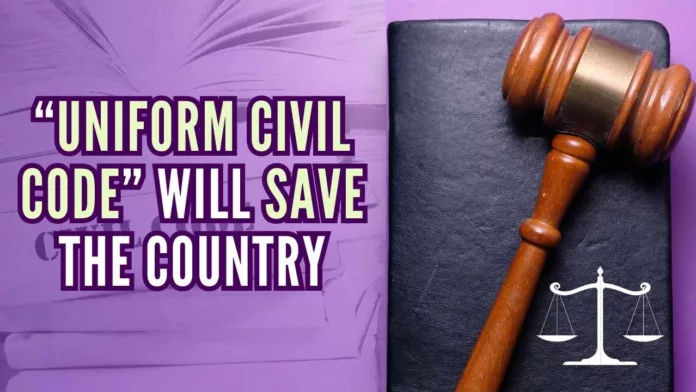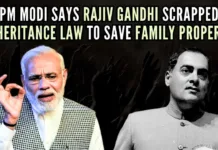
Uniform Civil Code; need of the hour in India
Politics can destroy a country, and politics can also save a country.
India is crippled because of successive governments’ pseudo-secular and discriminatory laws and policies.
In this pathetic situation, only the “Uniform Civil Code” (which implies the same laws and same rights for all Indian citizens irrespective of their religion) would save the country from a looming disaster.
Through the Law Commission of India’s latest Notice dated July 14, 2023, the BJP government has once again invited suggestions from the public (up to July 28, 2023) regarding the “Uniform Civil Code” after having done similar exercises in 2016 and 2018 as well.
Since BJP had promised to implement Uniform Civil Code in its election manifestoes of 2009, 2014, and 2019, it should have implemented the same after getting power in 2014 itself instead of inviting unnecessary suggestions from the public again and again.
Though it is uncertain when, in what shape, and whether BJP’s permanent promise of a Uniform Civil Code would ever be implemented, let us see its implications.
Meaning of ‘Uniform Civil Code’
As a legal term, the word “Code” means the collection of laws.
The doctrine of the “Uniform Code” is based on the timeless and universal principle of “equality before the law”. It means “the same laws” for every citizen in all matters like civil, criminal, etc.
The term “Uniform Civil Code” means the same laws in all civil matters for all citizens. Similarly, the term ‘Uniform Criminal Code’ means the same laws in criminal matters for every citizen.
India has got Uniform Criminal Code for every Indian citizen.
Unfortunately, except in Goa, there is no Uniform Civil Code in India in civil matters.
Goa got its Civil Code under Portugal. After Goa’s liberation in 1961, Goa Civil Code was retained as desired by Goans.
All Western democratic countries have uniform code for all citizens.
Secularism & pseudo-secularism
Real “secularism” implies separation of State and religion; “equality before the law”; the same laws and same rights for every citizen irrespective of his religion; justice to all, discrimination against none; and no majority and no minority.
However, in India, anything which is pro-minority and divisive is proclaimed as ‘secularism’ though this is actually ‘pseudo-secularism’.
The politics of ‘pseudo-secularism’ has divided the nation into majority and minority. Besides, it has given discriminatory laws and minority-appeasing policies which have deeply damaged Hindu civilization.
Indian National Congress (hereafter referred to as Congress) has been in power for a major period since 1947, and it is quite open about its minority appeasing and pseudo-secular politics.
While in opposition, BJP, the other major political party, had always supported Uniform Civil Code; and had denounced Congress Party’s pseudo-secularism.
However, after getting power in 2014, the BJP government has not fulfilled its perpetual promise of the Uniform Civil Code so far. On the contrary, it has continued the Congress-led governments’ discriminatory laws; and has vastly expanded minority-appeasing policies.
Discriminatory laws and policies
It is indispensable to implement ‘Uniform Civil Code’ at the earliest to rectify the deplorable situation because of the following pseudo-secular laws and discriminatory policies:
1. Pseudo-secular laws
Though the Indian Constitution does not define the terms ‘majority’ and ‘minority’, the Congress-led government’s “National Commission for Minorities Act, 1992” notified Muslims, Christians, Sikhs, Buddhists, and Zoroastrians as minorities in 1993; and Jains in 2014.
Besides creating Minority Affairs Ministry in 2006, Congress-led governments passed, inter alia, the following pseudo-secular and discriminatory laws:
- Places of Worship (Special Provisions) Act, 1991.
- The National Commission for Minorities Act, 1992.
- Wakf Act, 1995.
- The National Commission for Minority Educational Institutions Act, 2004.
- The Right of Children to Free and Compulsory Education Act, 2009.
After getting power in 2014, the BJP government has continued all the above-mentioned laws.
2. Discriminatory policies
- As the opposition party, BJP had termed the Congress-led government’s formation of the Sachar Committee and Minority Affairs Ministry in 2006 as communal, divisive, and “appeasement” of minorities.
But after getting power in 2014, the BJP government has not abolished Minority Affairs Ministry though it can be abolished immediately just by executive order without any voting in Parliament.
Rather, the BJP government has vastly expanded minority appeasing policies. - BJP’s unprecedented minority appeasement has caused irretrievable damage to Hindu civilization.
The government is giving scholarships, free ships, and many other economic incentives to minorities.
Some of the new schemes launched by the BJP government for minorities are “Nai Udaan”, “Naya Savera”, “Shadi Shagun”, Pradhan Mantri Jan Vikas Kryakram, “Padho Pardesh” etc. The government is allocating thousands of crores of rupees every year for minorities. - Immediately after winning the 2019 elections, the BJP government declared five crore scholarships for minorities in June 2019.
- BJP has not passed Dr. Satya Pal Singh’s Bill Number 226 of 2016 and Bill No 205 of 2019 (in Lok Sabha) which sought the same religious, educational, and cultural rights for Hindus as are given to minorities.
- BJP’s National Education Policy, 2020 expands minority appeasement in the field of education by creating the Socio-Economically Disadvantaged Groups (S.E.D.G.s) and including minorities also in “S.E.D.G.s” for special treatment.
- All prominent Hindu temples (and their estates) in India are controlled by various State governments whereas minorities’ places of worship are free from such control.
Constitution’s mandate
Indian Constitution repeatedly supports equality before the law and uniformity of laws.
Since the preamble of the Indian Constitution declares India a “SECULAR, DEMOCRATIC REPUBLIC” which is “constituted to secure” “JUSTICE”, “LIBERTY”, “EQUALITY” and “FRATERNITY” for all Indian citizens, these noble ideals can be achieved only through uniform laws and uniform rights.
And Article 14 of the Constitution regarding the Fundamental “Right to Equality before Law” declares, “The State shall not deny to any person equality before the law or the equal protection of the laws within the territory of India.”
Furthermore, Article 44 of the Constitution (appearing in Directive Principles of State Policy) declares, “The State shall endeavour to secure for the citizens a uniform civil code throughout the territory of India.”
Besides, Article 15(1) regarding the Fundamental Right of “Prohibition of discrimination” prohibits discrimination on the basis of religion.
Importantly, Fundamental Rights and Directive Principles of State Policy complement and supplement each other.
Thus, the Fundamental Right to “Equality before Law” of Article 14 can become effective only with the implementation of the Directive Principle of the “Uniform Civil Code” of Article 44.
Clarification regarding Article 25
It is relevant to note that the Fundamental Right to “Freedom of Religion” under Article 25 is not absolute, and it is also subject to other Fundamental Rights (like the Right to Equality, etc.) stipulated in Part III of the Constitution.
The relevant portion of Article 25 is self-explanatory; and is reproduced as follows:
- “25. (1) Subject to public order, morality, and health and to the other provisions of this Part, all persons are equally entitled to freedom of conscience and the right freely to profess, practice and propagate religion.
- Nothing in this Article shall affect the operation of any existing law or prevent the State from making any law —
- Regulating or restricting any economic, financial, political or other secular activity which may be associated with religious practice.”
Supreme Court’s full support
Vide its several judgments, Supreme Court has repeatedly urged the Parliament to implement Uniform Civil Code as per Article 44.
In 1985, in its judgment reported as Mohammad Ahmed Khan v. Shah Bano Begum, Supreme Court held, “A common civil code will help the cause of national integration by removing disparate loyalties to laws which have conflicting ideologies. It is the State which is charged with the duty of securing a uniform civil code for the citizens of the country.”
Afterward, in 1995, in Sarla Mudgal v. Union of India, Supreme Court remarked, “There is no justification, whatsoever, to keep in abeyance, any more, the introduction of the ‘Uniform Civil Code’ for all the citizens in the territory of India.”
In 2003, in John Vallamattom v. Union of India, Supreme Court commented, “It is a matter of great regret that Article 44 of the Constitution has not been given effect to.”
In 2019, in Jose Paulo Coutinho vs Maria Luiza Valentina Pereira, Supreme Court once again urged the Parliament to implement Uniform Civil Code.
It is now or never
Victims of pseudo-secular sophistry must come out of their self-limiting beliefs and self-sabotage.
The absence of the Uniform Civil Code in truncated India amounts to the perpetuation of the ‘two nations theory’ which was responsible for India’s division and creation of Pakistan in 1947.
By nullifying discriminatory laws and divisive policies, Uniform Code will liberate India from the sinister slavery of pseudo-secularism.
Moreover, as mentioned hereinbefore, only Uniform Civil Code cherished in Article 44 can ensure the Fundamental “Right to Equality before Law” of Article 14 of the Constitution.
With all Indians being governed by the same laws and enjoying the same rights, Uniform Civil Code would transform India into a very strong, harmonious, egalitarian, and united nation.
No one can have any valid objection to legal uniformity in civil matters when there is no objection to the already existing legal uniformity in criminal matters.
Thus, BJP must fulfill its perpetual promise; and implement the complete and genuine Uniform Civil Code.
And this auspicious task must be done at the earliest as per the Sanskrit maxim, “Shubhasya sheeghram.”
Note:
1. Text in Blue points to additional data on the topic.
2. The views expressed here are those of the author and do not necessarily represent or reflect the views of PGurus.
PGurus is now on Telegram. Click here to join our channel and stay updated with all the latest news and views
For all the latest updates, download PGurus App.
- “Uniform Civil Code” will save the country - July 29, 2023
- Can Hindu civilization survive so much discrimination? - February 2, 2023
- Form a nationalist party to save Hindu civilization - July 14, 2022











I fully agree with the learned author . Implementation of UCC is must for the survival of this great nation and ancient civilization. I salute the author for his courage to express the truth. This article should be shared on social media to every true Indian. Jai Hind.
This authentic article by Shri Arora is just brilliant, powerful and most urgent. The analysis of all the most relevant questions/concern regarding UCC has been spelled out with so much clarity, boldness and precision that no confusion can prevail.The approach is multidimensional incorporating all the primary aspects that include the meaning of UCC, the necessity of equality before the law and justice for all-having no place for majority versus minority outdated ideas, discriminating laws and policies against Hindus, and Indian Constitutional mandate citing many past legal cases, including the Article 25.The most relevant issues-constitutional, legal, political, social and ethical- have been given critical assessment. The article appeals in the strongest term for the implementation of the UCC at the earliest for eliminating further damage and danger to the unity, integrity, safety and security of the Hindu civilization.
My heartiest best wishes for the success of UCC, and warmest regards to Shri Arora Ji.
Dr. Shive Chaturvedi
Absolutely right Chaturvedi Ji. I fully share your patriotic feelings and views. Nation is getting destroyed due to unabetted appeasement policies . Its high time that all patriots must unite and raise the concern and demand to implement UCC immediately.
Its matter of our survival. World’s oldest civilization is facing existential threat.
Immediate implementation of UCC is the only legal and constitutional way to save this great nation and civilization which truly believe in peace, coexistence, freedom and harmony. Nations demands UCC, One Nation One Law, Equality for all.
Without equality, there is no democracy.
Without UCC, there is no freedom.
I fully agree with respected Arora Sir. Its High Time that Government should implement Uniform Civil Code to give equal rights to all its citizens. It will give equal rights and will galvanize the society and promote equality and harmony. If Govt implements UCC before forthcoming Assembly and Parliamentary elections, My vote is for sure and will that all my family members, friends and relatives will also vote for nation. Its the most important demand in national interest. Jai Hind.
I bow to the learned author for writing such brilliant masterpiece. Kudos.
Arora sir, hats off to your commitment towards Bharat varsha. I agree and endorse your views. Regards.
A well researched and very compelling exposition of a most important issue – the UCC.
Secularism, simply put, is the “setting aside” of the “divine law” systems, which have to be OBEYED, and cannot be queried, doubted, challenged or amended. Secularism allows for “man made laws”, ie democracy, by, for and to the people, which can be discussed, defined and amended by the people in keeping with their values. “Divine law” systems and man made laws are paradigmatically mutually exclusive. Nor can anyone follow both the LAWS simultaneously, which is like double jeopardy. Non uniform laws offend the fundamental right to equality, affect the basic structure of the constitution and tear apart the constitution and citizenry in every possible way. If everyone is equal, there is no minority or majority. The jews and parsis do not consider themselves as minorities and nobody else even qualifies to be so. The BJP, which has graduated from being an appeaser into being a junior partner in implementing “blasphemy laws” as the TI, NS, KH and other episodes show, needs a change of position, or a change of guard at the top, failing which the electorate must throw it out and bring in someone who will implement it. L&O issues arising out of the implementation of the UCC must be put down with a firm hand.
Bharatiya Janata Party (like its predecessor Bharatiya Jana Sangh) has always championed the cause of Uniform Civil Code. In fact, while in opposition, Bharatiya Janata Party used to vehemently support the agenda of Uniform civil Code.
Now that it is in power, Bharatiya Janata Party’s government must implement Uniform Civil Code at the earliest.
Very illuminating article. I endorse the views. Hope the government pays heed to the views.
SHREERAM PARANJPE
Yes indeed, a Uniform Civil and Criminal Code is a must as it defines our National Identity as One Land, One People, and One Nation.
The Right to Worship comes if and only if the people have the right to the shared National Identity with its boundaries defined and all people stand united to preserve the integrity and sovereignty of the nation to which they belong.
People who enjoy the rights of citizenship have duties and responsibilities to defend the nation as it is the foremost duty of all citizens. Freedom of religion and all other freedoms have meaning if the Supremacy of the nationhood is reflected in all the Laws of the Land.
As explained in this superb article, only Uniform Civil Code cherished in Article 44 can ensure the Fundamental “Right to Equality before Law” of Article 14 of the Constitution.
Moreover, because of Uniform Civil Code, “With all Indians being governed by the same laws and enjoying the same rights, Uniform Civil Code would transform India into a very strong, harmonious, egalitarian and united nation”.
Nice Sir, Completeley agree with you.
Many thanks and deep gratitude to J.G. Arora Ji for writing such a flawless article – both from imparting knowledge and from solving Bharat’s existential crisis points of view. It is imperative that this write up be circulated as widely as possible and, to ensure that the top BJP Government Ministers do everything in their power to implement UCC without further delay.
It is shocking that though Uniform Civil Code is the basic requirement of any democratic and secular country, India is yet to implement this important feature.
This is despite the clear direction contained in Article 44 (of Indian Constitution) which proclaims that “The State shall endeavour to secure for the citizens a uniform civil code throughout the territory of India.”
Though Indian Constitution came in effect in 1950, even after the lapse of so many years, Uniform Civil Code is yet to be implemented.
There should be no further delay in implementing Uniform Civil Code.
It is an excellent and a thought provoking article which must reach every patriot all over the country.
Hats off to Shrimanji ARORA-JI our legal scholar! Frankly, there is nothing much to add!! Namazi are above the law always; being in denial mode, they are blaming us for polygamy; with no regard for truth, they say their birthrate is decreasing.
Polygamy needs to be reduced to bigamy for all irrespective of religion. Government needs to help Sanatanis like they did to parsees.
Hats off to Shrimanji ARORA-JI our legal scholar! Frankly, there is nothing much to add!!
Polygamy needs to be reduced to bigamy for all irrespective of religion. Government needs to help Sanatanis like they did to parsees.
Make UCC mandatory for Muslim man marrying a woman not born into Muslim family. This will check love jihad.
I fully agree with the author that “By nullifying discriminatory laws and divisive policies, Uniform Code will liberate India from the sinister slavery of pseudo-secularism.”
Besides, the author has rightly mentioned that “With all Indians being governed by the same laws and enjoying the same rights, Uniform Civil Code would transform India into a very strong, harmonious, egalitarian and united nation.”
Thank You. I fully agree with you. The Laws of the Land must reflect the National Identity and not the identity of religions or the identity of the political beliefs of the people. The Land must be recognized as the Sovereign entity and the people derive rights and privileges by embracing the Nationhood.